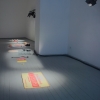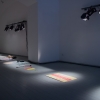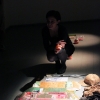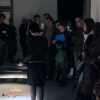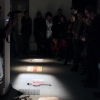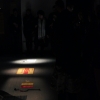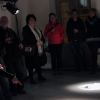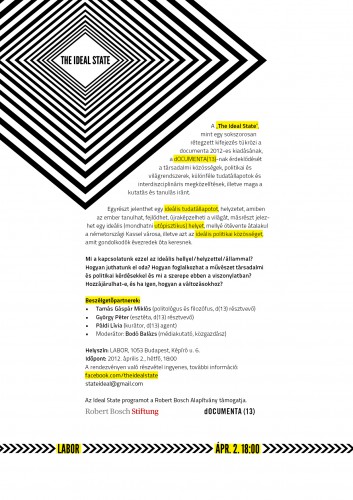Pavel Sterec presents: FOR THE FUTURE AUDIENCE
Warning: preg_match(): Compilation failed: invalid range in character class at offset 34 in /var/www/labor.c3.hu/wp-content/plugins/nextgen-gallery/products/photocrati_nextgen/modules/nextgen_basic_tagcloud/package.module.nextgen_basic_tagcloud.php on line 183
| 2012. Apr. 6. | 19:00 |
Objects become witnesses of our times through acts by employees of museums that have the duty to acquire new objects. Even though the transformation of the usual object into an artefact changes nothing in its look, the object enters a different sphere of existence. To exclude something, describe it, classify it – this is not a mechanical process. On the contrary, it requires extraordinary sensitivity in order to decide what will be able to speak about our times in the future. In a performative lecture two museum employees are cast into roles of “puppeteers animating their artefacts,” lending their voices to these objects.
Zsófia Frazon is an ethnographer at the Museum of Ethnography in Budapest. She organises the MADOK research program (aiming to set up and run a nationwide cooperation between museums studying contemporary society and culture). Her research fields are contemporary consumerism, the role of objects in personal lifestyle, urban culture and subcultures, modern and post-modern everyday life and their representation. She worked in many exhibitions in or out museum, and wrote a book in the title “Museum and Exhibition – The Spaces of Redrawing” (Múzeum és kiállítás – Az újrarajzolás terei; 2011).
Roland Perényi (1976) social
historian, museologist. Studied at ELTE University history and german studies. In 2010 he earned a PHD degree in social history. Studies mainly the social history of fin de siecle Budapest. Works since 2003 at Budapest History Museum, Museum Kiscell. Since 2010 he works as deputy director of Museum Kiscell. Curates the Collection of City Maps, Prints and Manuscripts.
The work of Pavel Sterec (1985, lives and works in Prague), a finalist of the Jindřich Chalupecký Award, most frequently adopts the form of complicated installations which are painstakingly thought out to the last detail and respond to various types of stimuli.
The performative lecture had been realized during Pavel Sterec’s residency in Budapest, in the frame within the residency program of the Young Artists Association and the Visegrad Fund.
Supported by:
Visegrad Fund, Workshop Foundation
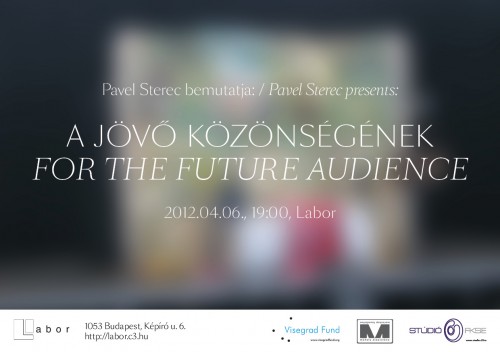 Objects become witnesses of our times through acts by employees of museums that have the duty to acquire new objects. Even though the transformation of the usual object into an artefact changes nothing in its look, the object enters a different sphere of existence. To exclude something, describe it, classify it – this is not a mechanical process. On the contrary, it requires extraordinary sensitivity in order to decide what will be able to speak about our times in the future. In a performative lecture two museum employees are cast into roles of “puppeteers animating their artefacts,” lending their voices to these objects.
Objects become witnesses of our times through acts by employees of museums that have the duty to acquire new objects. Even though the transformation of the usual object into an artefact changes nothing in its look, the object enters a different sphere of existence. To exclude something, describe it, classify it – this is not a mechanical process. On the contrary, it requires extraordinary sensitivity in order to decide what will be able to speak about our times in the future. In a performative lecture two museum employees are cast into roles of “puppeteers animating their artefacts,” lending their voices to these objects.
Zsófia Frazon is an ethnographer at the Museum of Ethnography in Budapest. She organises the MADOK research program (aiming to set up and run a nationwide cooperation between museums studying contemporary society and culture). Her research fields are contemporary consumerism, the role of objects in personal lifestyle, urban culture and subcultures, modern and post-modern everyday life and their representation. She worked in many exhibitions in or out museum, and wrote a book in the title “Museum and Exhibition – The Spaces of Redrawing” (Múzeum és kiállítás – Az újrarajzolás terei; 2011).
Roland Perényi (1976) social historian, museologist. Studied at ELTE University history and german studies. In 2010 he earned a PHD degree in social history. Studies mainly the social history of fin de siecle Budapest. Works since 2003 at Budapest History Museum, Museum Kiscell. Since 2010 he works as deputy director of Museum Kiscell. Curates the Collection of City Maps, Prints and Manuscripts.
The work of Pavel Sterec (1985, lives and works in Prague), a finalist of the Jindřich Chalupecký Award, most frequently adopts the form of complicated installations which are painstakingly thought out to the last detail and respond to various types of stimuli.
The performative lecture had been realized during Pavel Sterec’s residency in Budapest, in the frame within the residency program of the Young Artists Association and the Visegrad Fund.
Supported by:
Visegrad Fund, Workshop Foundation


